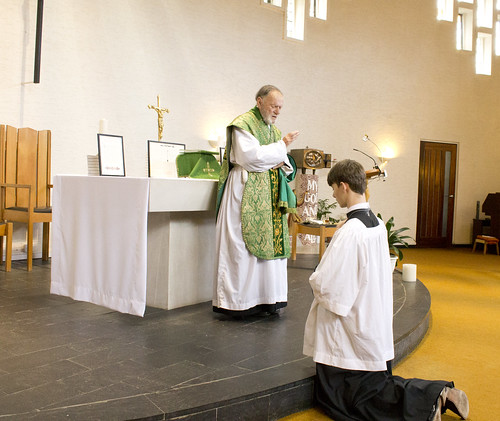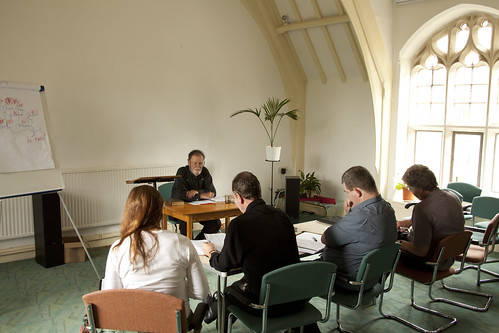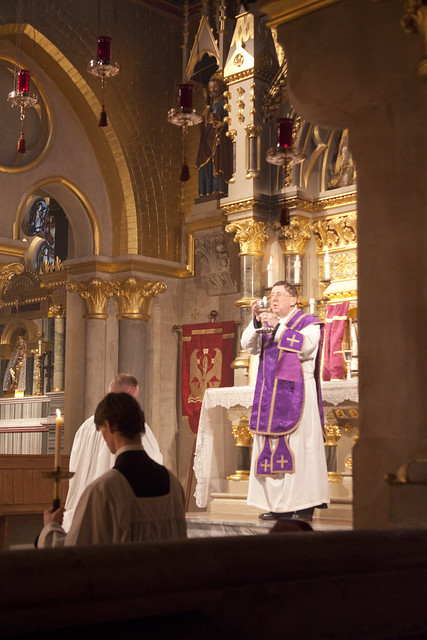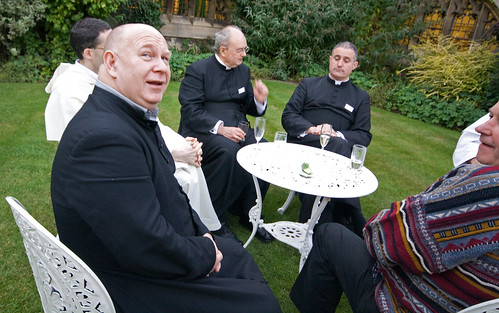Chairman's Blog
Rogation Mass in Maiden Lane, London
Fr Michael Cullinan was the celebrant. The 'minor rogations' are the Monday, Tuesday and Wednesday before the Ascension, and are traditionally days of penance: hence the violet vestments. It was accompanied by the Southwell Consort with chant and polyphony.
Kingsley Lewis, RIP
A Welshman and a gentleman, devoted to the traditions of the Church. Requiescat in pace.
A Defence of Monarchy: podcast with Gavin Ashenden
My two-part conversation with Gavin Ashenden is now available, on the subject of a book I edited, A Defence of Monarchy: Catholics Under a Protestant King.
HE Eduard von Habsburg, Hungarian Ambassador to the
Holy See
This is an incredibly interesting and well done book.
It is especially valuable that it makes the argument in favour of even a weak
monarchy, in its constitutional powers and even in terms of the personal
commitments of it representatives. Instead of giving way to despair, the book
encourages us to continue to appreciate the constitutional and symbolic
importance of monarchy, while we wait for a monarchy that embodies Catholic
principles in their fullness.
Fr Calvin Robinson, Patron of the British Monarchist
Society
This book provides many lessons to Roman Catholics on
why the British monarchy is a good thing; how Christians can be united around
the British institution, even with our differences; and a staunch reminder that
British heritage is undeniably Catholic, and a strong preserver of Catholic
tradition through ceremonies such as the coronation and funeral services of the
monarch. The last thing any traditionalist should want to see is the end of
Catholic tradition.
Gavin Ashenden, Chaplain to the Queen 2008-2017
This excellent and intriguing new book edited by Dr Shaw, defending the monarchy from a Catholic perspective, offers not only an informed perspective on constitutional developments and realities, but makes a powerful case that the monarchy we have offers us a great deal more than would a republic. It also serves as a defence of the integrity of Elizabeth II against under-informed anxieties held by some passionate defenders of the rights of the unborn child. The grasp of constitutional and historical development makes refreshing reading for anyone interested in our constitutional settlement not only as a matter of history, but also to furnish us with ways of judging the political dilemmas a turbulent cultural future may present us with.
Fr John Hunwicke: a brief appreciation
 |
| The Vidi Aquam before Sunday Mass at the St Catherine's Trust Family Retreat, after Easter, 2013. |
.
 |
| Fr Hunwicke giving 'First Blessings' after his ordination in 2012, in the church of St Winifride, Holywell, during the St Catherine's Trust Summer School and LMS Latin Course. |
Catherine of Siena, Fr John Hunwicke of the Ordinariate of Our Lady of
Walsingham, died.
He was a convert Anglican cleric, who was ordained as a
Catholic priest in 2012. Although already retired by this time, he was always
willing to put his great erudition and long experience of teaching to use for
the cause of the Traditional Mass.
 |
| Fr H. celebrating Mass for the Guild of St Clare Sewing Retreat in 2022. The young server here was the recipient of the 'First Blessing' in the photo above. |
As an Anglican, Fr Hunwicke was a ‘Papalist’, one who accepted the supremacy of the Pope in principle, and also a proponent of the Traditional Roman Rite, which he had learnt as a seminarian at St Stephen’s House in Oxford before the liturgical reform. He joined the Latin Mass Society as a ‘Friend’, since only Catholics can be full members.
For thirty years he taught Latin at Lancing College. His last post as an Anglican was to the ancient church of St Thomas the Martyr, near the railway station in Oxford.
 |
| Teaching Latin for the LMS Residential Latin Course, 2013 |
 |
| Celebrating High Mass in St David's, Pantasaph, 2013. |
Wherever he went he was valued for his great wit and erudition, and also for his pastoral touch. Joining the ‘Roman Church’ was a momentous and courageous move, and some on our side of the Tiber had mixed feelings about a batch of new recruits who combined powerful intellects with strong characters. I like to think, nevertheless, that Traditional Catholics, such as those in the Latin Mass Society, made their appreciation of him clear.
 |
| Preaching at the SCT Summer School / Latin Course, 2014. |
The Monarchy, Democracy, and God's Rule
My latest on 1Peter5 is about the monarchy.
I don’t expect, in general, American citizens to be easily impressed by arguments for a hereditary monarchy, but the downsides of an elected executive Presidency are perhaps most on display in the year of a bitterly contested election. The extraordinary “bloodbath” discourse currently swamping my social media feed is a reminder that, just as many conservatives and Christians feel their very existence and identity is threatened by the progressive state, so many progressives in positions of influence in the media, academia and politics feel something similar about a possible Trump second term. The prestige and legitimacy of elements of the constitution that perdure through the electoral cycle—the civil service, the armed forces, the judiciary, and for some lucky nations a hereditary monarchy—should not be seen as regrettable limitations on the democratic principle, but as a set of things that can nurse democracy through its stickiest moments.
The Catholic case for monarchy is not just about its practical usefulness in a modern democracy, however, but about its symbolic importance, which translates remarkably well between the conditions of democratic and non-democratic, modern and pre-modern, and Western and non-Western polities. This is a central point of a collection of essays which I have edited to respond to criticisms of the monarchy in the context of last year’s British royal succession, not just by addressing some rather ignorant political and legal arguments, but by defending the idea of a person at the apex of a constitution who is as much as possible identified with that role: who is the head of state not by virtue of his own or anyone else’s choice, but just by being who he is.
Roger Buck reviews 'The Latin Mass and the Intellectuals'
Roger Buck, author of The Gentle Traditionalist and Cor Jesu Sacratissimum: from Secularism and the New Age to Christendom Renewed, has kindly reviewed my book The Latin Mass and the Intellectuals on his website.
For one garners insight here from not one—but many cultured, thoughtful, even brilliant men and women hailed in their fields, even sometimes hailed as geniuses.
Their brilliance is evident in the book and these profound souls were often astoundingly prophetic as to the steep price the Church would pay for sacrificing her liturgy. Indeed, as the non-Catholics here also recognised, the West itself would pay a steep price. A great irony in the book is that these were all lay people, even at times agnostic or atheist ones, but who clearly saw things the clerics could not.
What is needed in the battle for the Mass is not ‘clickbait’, Internet flames, snide memes, specious arguments from statistics or other trivialities—but precisely the profound depths Joseph Shaw reveals in this book.
I cannot recommend it enough. Turn off the Internet, read it contemplatively, listening attentively to the great minds on offer here—and see if you do not emerge with a deeper, wiser perspective as a result. And if you have friends still dithering on the fence as to this central battle of our time, buy them a copy and beg them to read it, too! It is that important.
Read the whole thing there.
More about the book here.
Guild of St Clare Sponsorship for the Royal School of Needlework, 2024
 |
| A Guild of St Clare Sewing Retreat |
Do you have a passion for hand embroidery and the restoration of fine vestments?
We are pleased to announce an exciting sponsorship opportunity for those interested in studying Needlework.
The Guild of St Clare is offering sponsorship for candidates wishing to study The Royal School of Needlework Certificate Course.
Deadline for applications is the 23rd June 2024
See HERE for more information and how to apply.
Iota Unum talks: Dan Hitchens and Sebastian Morello
 |
| Sr Clare Crockett |
I am pleased to announce two talks in the Latin Mass Society's Iota Unum series:
Friday 17th May, Dan Hitchens: ‘Sister Clare Crockett: a modern saint?’
Friday 28th June, Sebastian Morello: ‘Cartesian Catholicism and the Loss of Sacred Space’
Talks take place in the basement of Our Lady of the Assumption; please enter by the back entrance into the basement: 24 Golden Square, W1F 9JR near Piccadilly Tube Station (click for a map).
Doors open at 6:30pm; the talk will start at 7pm.
There is a charge of £5 on the door to cover refreshments and other expenses.
New edition of Gregorius Magnus published
This edition has a photographic report on the Summorum Pontificum Ad Petri Sedem pilgrimage, articles from new contributors, and contributions from the the magazines of the FIUV's member associations.
- Pope Benedict, one year on: Caroline Farey on 'The Way of Beauty'; Andrew Cusack on the liberation of the Old Mass.
- 120 year anniversary of Evelyn Waugh
- St Thomas Becket, by Thomas Colsey
- T.S. Eliot, by Robert Lazu Kmita
- Cardinal Ambongo on Fiducia supplicans, by Michael Haynes
- A Traditional Catholic school in Nigeria
See it on ISSUU, optimised for mobile devices.
Download the pdf for viewing on a screen.
Download the high-res pdf for printing.
Join the email list here.
Please support the FIUV by becoming a Friend.
Why do bishops cover up sexual abuse? In the European Conservative
My article begins:
The Catholic Church’s clerical sex abuse crisis may be said to have entered public consciousness with the Boston Globe’s revelations, which began in January 2002, and it has yet to go away. The standard explanation of it is that bishops and other superiors covered up abuse in order to protect the reputation of the Church, but this is almost the opposite of the truth. The reality is that sexual abuse was covered up as part of a strategy of calculated risk-taking, not for the benefit of the institution, but for the benefit of the superior.
I spent many years in Roman Catholic institutions populated by abusers and, while never a victim myself, I got to know some of the perpetrators and some of those who protected them. My argument, however, is based on well-established patterns of behaviour which can be found beyond the confines of the Roman Church. These patterns extend back in time at least as far as the 1960s, and they continue to persist.










